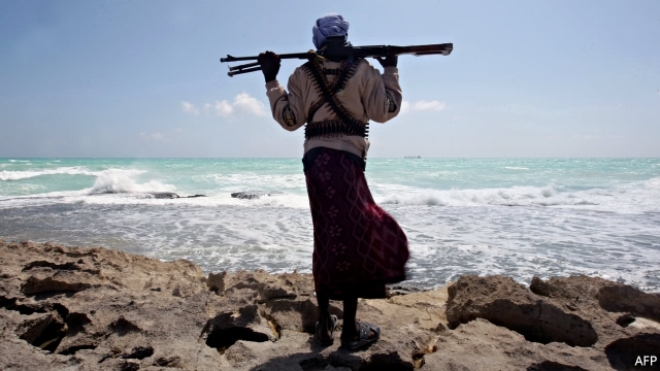
Tuesday January 16, 2018
Activity in the west is increasing as the east quietens down

MODERN African pirates prefer machetes, machineguns and ransoms to cutlasses and parrots. They can make millions of dollars from one captured ship.
Ten years ago Somalia’s coast was the centre of the maritime-hijacking world. The country lacked a coastguard or functioning state machinery, which allowed heavily armed pirates to sail up to huge cargo vessels in speedboats before boarding and taking crew and ship hostage. But 2017 was not a good year for buccaneers.
According to the International Maritime Bureau (IMB), which monitors crime at sea, global piracy and robbery at sea dipped to their lowest points in over two decades. So what is happening to Africa’s pirates?
According to the IMB, just nine vessels were hijacked off the Somali coast last year. This is in part because regional security has improved dramatically. The Gulf of Aden leads to the Suez canal, through which roughly 10% of global trade flows. After scores of kidnaps and hijackings, the world launched a huge naval anti-piracy effort in 2008.
For the first time since the second world war, all five permanent members of the UN Security Council deployed forces together, with the aim of countering the threat and patrolling the Somali coastline. Along with the introduction of armed guards, barbed wire and evasive-manoeuvre training on merchant ships, this campaign has slashed the number of successful boarding incidents off Somalia, according to Henry MacHale at Aspen Insurance.
Somali pirates may have hung up their Kalashnikovs for now, but on the other side of Africa, piracy off the Nigerian coast is increasing. In 2017, 33 incidents of piracy and robbery at sea, successful or otherwise, were reported within 12 nautical miles of the coastline.
In 2011 there were ten. Ultra-violent Nigerian pirates armed with heavy machineguns and rocket-propelled grenades are often behind the attacks. Somali pirates usually board vessels, then drop anchor and hold them until they get ransom money.
Nigerian pirates are different. They move fast, take part in ferocious gun-battles and snatch victims off ships before retreating into the Niger Delta’s maze of rivers, where it is very difficult for security forces to find them.
The number of kidnappings is also sky-high. According to the IMB, 65 of the 75 crew members kidnapped in 2017 were taken in or around Nigerian waters.
Piracy in the Gulf of Guinea, which stretches from Gabon to Liberia, has not reached the levels it did off Somalia. But Cyrus Mody from the IMB suggests that the figures underplay the danger.
The IMB’s data do not include attacks on fishing craft or ferries, which are certainly being terrorised by the pirates. Additionally, it seems likely that operators are not reporting some incidents.
“Over the years [the Nigerian pirates] haven’t been arrested or prosecuted it seems,” says Mr Mody. “Ship owners have lost trust in the system.” By reporting an incident they risk suffering violent attacks on their ships in future. So they stay quiet.